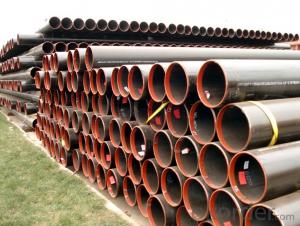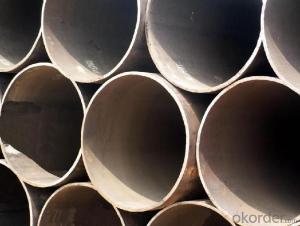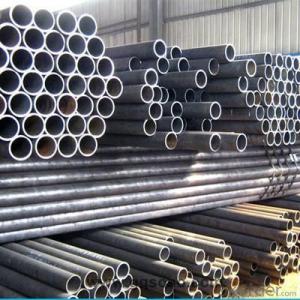API GRADE CARBON STEEL SEAMLESS PIPES WITH FACTORY PRICE
- Loading Port:
- Tianjin
- Payment Terms:
- TT or LC
- Min Order Qty:
- 50 m.t.
- Supply Capability:
- 500 m.t./month
OKorder Service Pledge
OKorder Financial Service
You Might Also Like
Product Description:
Quick Details
Thickness: | 2.0 - 85 mm | Section Shape: | Round | Outer Diameter: | 17 - 914.4 mm |
Secondary Or Not: | Non-secondary | Application: | Oil Pipe | ||
Technique: | Hot Rolled | Certification: | API | Surface Treatment: | VARNISH PAITING |
Special Pipe: | API Pipe | Alloy Or Not: | Non-alloy | END: | PLAIN,BEVELED OR THREADED |
OKorder is offering high quality Seamless Steel Alloy Pipe at great prices with worldwide shipping. Our supplier is a world-class manufacturer of steel pipe, with our products utilized the world over. OKorder annually supplies products to European, North American and Asian markets. We provide quotations within 24 hours of receiving an inquiry and guarantee competitive prices.
Product Applications:
Seamless Steel Alloy Pipe is ideal for long distance oil, gas, and natural gas pipelines on land and offshore. They can also be applied in construction projects, offshore platforms, power stations, the petrochemical industry and municipal construction.
Product Advantages:
OKorder's Steel Pipe is durable, resists corrosion and is recyclable.
Main Product Features:
· Premium quality
· Prompt delivery & seaworthy packing (30 days after receiving deposit)
· Corrosion resistance
· Professional Service
· Competitive pricing
Product Pictures:
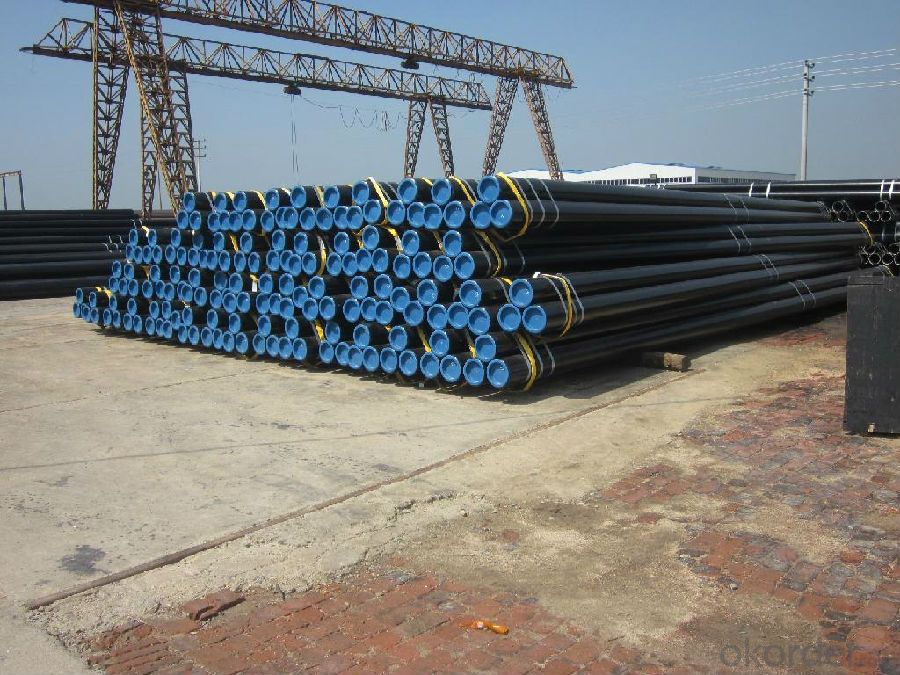
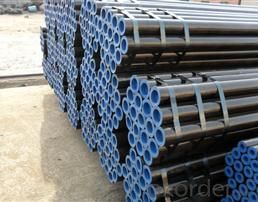
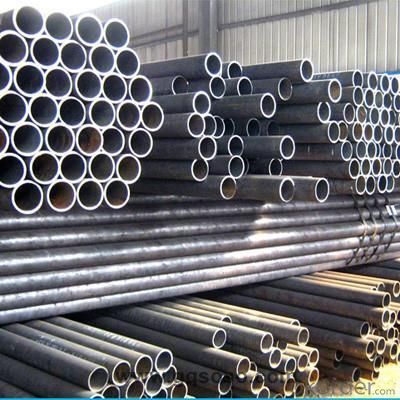
- Q:What is a flange and how is it used in steel pipes?
- A flange is a mechanical device that is used to connect two sections of steel pipes together. It consists of a flat or raised ring that is attached to the end of each pipe section. The flange provides a surface for the pipes to be bolted or welded together, creating a secure and leak-proof joint. It also allows for easy disassembly and reassembly of the pipes when necessary. Flanges are commonly used in various industries, such as oil and gas, water treatment, and manufacturing, where the connection between steel pipes needs to be strong and reliable.
- Q:What is the difference between ERW (Electric Resistance Welded) and LSAW (Longitudinal Submerged Arc Welded) steel pipes?
- ERW (Electric Resistance Welded) steel pipes are manufactured by passing an electric current through the steel strip or plate to generate heat, which results in the fusion of the edges together to form a pipe. On the other hand, LSAW (Longitudinal Submerged Arc Welded) steel pipes are produced by submerging the steel plate or strip into a molten bath of welding flux and then initiating the welding process. The main difference between ERW and LSAW steel pipes lies in their manufacturing processes and the resulting pipe structure. ERW pipes have a longitudinal seam along their length, created by the fusion of the edges, while LSAW pipes have a single longitudinal seam that is formed by the submerged arc welding process. This difference in welding techniques gives LSAW pipes a higher degree of dimensional accuracy and stability, making them suitable for applications that require precise measurements and strong structural integrity. Additionally, LSAW pipes have a larger diameter range and can be produced in larger sizes compared to ERW pipes. This makes LSAW pipes well-suited for conveying large volumes of fluid or gas, such as in oil and gas pipelines. Conversely, ERW pipes are commonly used in applications that require smaller sizes and lower pressure requirements, such as water supply systems or structural applications. In summary, the main differences between ERW and LSAW steel pipes lie in their manufacturing processes, resulting pipe structure, size capabilities, and applications.
- Q:What are the different types of steel pipe fittings for plumbing systems?
- There are several different types of steel pipe fittings for plumbing systems, including elbows, tees, couplings, unions, reducers, and flanges.
- Q:Galvanized steel pipe DN100 and SC100
- DN is the meaning of "bore", also expressed in water supply and drainageSC is welded steel pipe, generally GB tube, that is, thick walled steel pipe, look at the design requirementsMT refers to the wire tube, usually thin-walled tube, there are KBG and JDG
- Q:Can steel pipes be used for underground water lines?
- Yes, steel pipes can be used for underground water lines.
- Q:Can steel pipes be used for conveying slurry?
- Yes, steel pipes can be used for conveying slurry. Steel pipes are widely used in various industries for transporting different types of fluids, including slurry. Slurry is a mixture of solid particles suspended in a liquid, and steel pipes are well-suited for handling such mixtures due to their strength, durability, and resistance to corrosion. Steel pipes are also known for their high-pressure and high-temperature capabilities, making them suitable for conveying slurry in demanding applications such as mining, dredging, and wastewater treatment. Additionally, steel pipes can be easily welded, allowing for the construction of long pipelines that can efficiently transport slurry over long distances. However, it is important to consider the specific characteristics of the slurry being conveyed, such as particle size, density, and abrasiveness, to ensure proper pipe selection and design for optimal performance and longevity.
- Q:Can steel pipes be used for conveying food and beverages?
- Steel pipes can be used for conveying food and beverages, but certain precautions need to be taken to ensure their safety and suitability for this purpose. Firstly, it is important to choose food-grade stainless steel pipes that are specifically designed for handling food and beverage products. These pipes are made from high-quality stainless steel that is resistant to corrosion and does not leach harmful substances into the food or beverage. Secondly, the pipes should be properly cleaned and sanitized before and after each use to maintain hygiene standards. Regular cleaning and maintenance will prevent the accumulation of bacteria or contaminants that could potentially contaminate the food or beverage being transported. Additionally, it is crucial to consider the compatibility of the food or beverage with the steel pipes. Certain acidic or corrosive substances may react with the steel, causing contamination or compromising the integrity of the pipes. In such cases, alternative materials like food-grade plastic or rubber may be more suitable. Overall, steel pipes can be used for conveying food and beverages, but it is essential to ensure the use of food-grade stainless steel pipes, proper cleaning and sanitization, and compatibility with the specific food or beverage being transported. Following these guidelines will help maintain the safety and quality of the food or beverage during transportation.
- Q:How are steel pipes used in the automotive manufacturing industry?
- Steel pipes are commonly used in the automotive manufacturing industry for various applications such as exhaust systems, fuel lines, and structural components. They provide durability, strength, and resistance to heat and corrosion, making them ideal for withstanding the harsh conditions of vehicles.
- Q:How are steel pipes used in wastewater treatment?
- Steel pipes are an essential component in the wastewater treatment process. They are used to transport and distribute wastewater from various sources to the treatment facilities. Steel pipes are chosen for this purpose due to their durability, strength, and resistance to corrosion. In wastewater treatment plants, steel pipes are commonly used for multiple applications. Firstly, they are used for the intake of raw wastewater. These pipes are typically large in diameter to accommodate the high flow rate of incoming wastewater. Steel pipes are ideal for this purpose as they can withstand the pressure and turbulence of the wastewater flow. Once inside the treatment facility, steel pipes are used to transport the wastewater to different treatment processes. They connect various units such as screens, grit chambers, sedimentation tanks, and biological reactors. Steel pipes are preferred in these applications due to their ability to handle the corrosive elements present in wastewater, such as chemicals, acids, and gases. Additionally, their durability ensures a long service life, reducing maintenance and replacement costs. Steel pipes are also utilized in the wastewater treatment process for the distribution of treated water. After the wastewater is treated, it undergoes disinfection and other processes to remove harmful contaminants. The treated water is then distributed through steel pipes to be reused for irrigation, industrial processes, or discharged back into water bodies. Furthermore, steel pipes are employed in the construction of wastewater treatment infrastructure. They are used in the installation of underground sewer lines, pumping stations, and manholes. Steel pipes provide the necessary strength and stability to withstand the weight of the soil and other external forces. In summary, steel pipes play a vital role in wastewater treatment by transporting and distributing wastewater, connecting different treatment units, and distributing treated water. Their durability, resistance to corrosion, and ability to handle high-pressure flows make them an ideal choice for this demanding application.
- Q:How are steel pipes used in geothermal energy systems?
- Steel pipes are commonly used in geothermal energy systems to facilitate the transport of fluids, such as water or steam, between the geothermal source and the power plant. These pipes are designed to withstand high temperatures and pressures, ensuring the safe and efficient transfer of geothermal fluids. Additionally, steel pipes are used in the construction of geothermal wells, providing structural support and maintaining the integrity of the wellbore.
1. Manufacturer Overview |
|
|---|---|
| Location | |
| Year Established | |
| Annual Output Value | |
| Main Markets | |
| Company Certifications | |
2. Manufacturer Certificates |
|
|---|---|
| a) Certification Name | |
| Range | |
| Reference | |
| Validity Period | |
3. Manufacturer Capability |
|
|---|---|
| a)Trade Capacity | |
| Nearest Port | |
| Export Percentage | |
| No.of Employees in Trade Department | |
| Language Spoken: | |
| b)Factory Information | |
| Factory Size: | |
| No. of Production Lines | |
| Contract Manufacturing | |
| Product Price Range | |
Send your message to us
API GRADE CARBON STEEL SEAMLESS PIPES WITH FACTORY PRICE
- Loading Port:
- Tianjin
- Payment Terms:
- TT or LC
- Min Order Qty:
- 50 m.t.
- Supply Capability:
- 500 m.t./month
OKorder Service Pledge
OKorder Financial Service
Similar products
New products
Hot products
Related keywords
